Two years after the announcement of the candidacy of Pierre Nkurunziza for another term that plunged the country into a political crisis, Burundi is struggling to see the end of the tunnel.
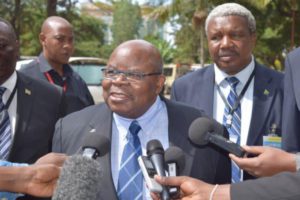 The summit of Heads of State of the East African Community next month could pave the way for an end to the crisis. In any case, it is the hope of the Burundian people, who do not want to be caught up in despair caused by stalling talks and a political and economic crisis without a solution.
The summit of Heads of State of the East African Community next month could pave the way for an end to the crisis. In any case, it is the hope of the Burundian people, who do not want to be caught up in despair caused by stalling talks and a political and economic crisis without a solution.
It all began on April 25, 2015 with the announcement of another term of Pierre Nkurunziza. A term deemed illegal, unconstitutional and contrary to the observance of the Arusha Peace Agreement by protestors.
They took to the streets the very next day, demanding the withdrawal of the candidacy of the outgoing president who had just spent 10 years in office. Protests were harshly repressed by the police.
On May 13, 2015, Burundi faced a failed coup d’état while President Pierre Nkurunziza was in Dar es Salaam, Tanzania, at the summit of the Heads of State of the East African Community. As a result, part of the political class, opposed to the third term was forced into exile where it created CNARED platform. The outgoing president had no one to stand in his way during the elections. He was re-elected on July 21, 2015.
In a meeting in Entebbe, Uganda on 28 December 2015, the mediator in the Burundi conflict, Yoweri Museveni, Ugandan President, decided to take the Burundian issue in his own hands. He set a date for dialogue in Kampala in January 2016.
The appointment was rejected by the government of Burundi as CNARED was invited to Entebbe.
Meanwhile, the “Halt to the Third Term movement” was withdrawing from the opposition platform, CNARED.
Bujumbura was, during the month of February, the scene of grenade explosions and shootings all over the capital.
Terrorist acts, according to the government which responded with arrests and a large deployment of police and military forces in the city. Whether or not it was a simple coincidence, Burundi received important visits during that month.
On February 22, it was first of all the visit of the Secretary General of the United Nations, Ban Ki Moon. Shortly after him, from February 24 to 25, a “high-level delegation” of the African Union, with the presidents of Senegal, Gabon, Mauritania, South Africa and the Prime Minister of Ethiopia, arrived. The visits were criticized by the opposition which considered them as a kind of legitimizing of President Nkurunziza.
In March, the European Union officially suspended its direct aid to the Burundian government for non-compliance with its commitments, according to the Cotonou Agreement.
A series of resolutions
The UN Security Council decided in April to consider the case of Bujumbura. On the 1st of the very month, resolution 2279 decided to send UN policemen to Burundi without specifying their number.
On 13 April, Bujumbura said that “it had undertaken to accept a presence limited to about 20 unarmed foreign police officers.”
The talks resumed on April 21 in Arusha, this time without CNARED, which was not invited by the facilitator Benjamin Mkapa. However, CNARED members who were invited individually were present.
They were threatened to be excluded from the platform. It was not the case, however.
Back to dialogue on July 12-14, 2016, it was a fiasco. The government delegation left the room because of “the presence of some personalities prosecuted by the Burundian justice.”
On 28 July, the Security Council got involved in the process and adopted resolution 2303, which decided on the deployment of 228 UN police officers in Burundi for an initial period of one year on the basis of a proposal made by France. Bujumbura strongly denounced it and refused the deployment of UN police in Burundi.
The year 2016 ended with the shocking departure of facilitator Mkapa. During his visit to Bujumbura to meet with the various actors in this dialogue, the facilitator declared, before his departure, on December 9, 2016, that Pierre Nkurunziza’s term was legal and legitimate.
The last round of the Arusha dialogue from 16 to 18 February 2017 was attended by prominent figures wanted by the Burundian justice. The government, for its part, boycotted the session, which undermined the smooth running of dialogue.
The facilitation, after consultation with the mediator, decided to send an envoy to Burundi. He was the bearer of a message to the Burundian President. The correspondence asked the latter to grant temporary immunity to the people prosecuted in order to participate in the dialogue. The facilitator met with a refusal from Bujumbura. Former Tanzanian President Benjamin Mkapa said he was powerless and called for the summit of EAC Heads of state.
Reactions
Charles Nditije:
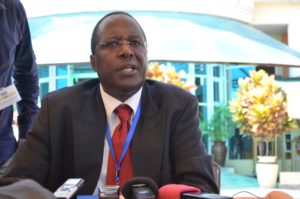 Two years after the outbreak of the crisis, CNARED Chairman says the violations related to the challenge of the candidacy of Pierre Nkurunziza continue. The record shows more than 1,000 people killed, more than 8,000 political prisoners, more than 500,000 exiles. “We take this opportunity to offer our condolences to families that have lost theirs.”
Two years after the outbreak of the crisis, CNARED Chairman says the violations related to the challenge of the candidacy of Pierre Nkurunziza continue. The record shows more than 1,000 people killed, more than 8,000 political prisoners, more than 500,000 exiles. “We take this opportunity to offer our condolences to families that have lost theirs.”
Charles Nditije pays tribute to all the people, especially the youth that paid a high price. He deplores the inability of the international community and the sub-region with regard to this tragedy. We invite them to consider the gravity of the situation in order to put in place mechanisms to protect the population.
The leader of the coalition of the opposition parties in exile proposes an inclusive dialogue as the only solution that will bring peace and security in a sustainable way. He asked the summit of EAC Heads of state to demand Bujumbura to accept the negotiations. Otherwise, he calls for an economic and arms embargo and targeted sanctions for all those dignitaries opposed to an inclusive dialogue.
Willy Nyamitwe: “Burundi is not in crisis”
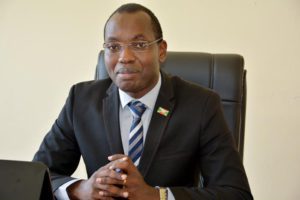 For the Senior Adviser to the President, one cannot talk about a crisis when the country is functioning normally and all institutions from the 2015 elections are in place. As for the figures mentioned, Willy Nyamitwe refers to “a war of figures, an exaggeration for political purposes”, of illegal regime change.
For the Senior Adviser to the President, one cannot talk about a crisis when the country is functioning normally and all institutions from the 2015 elections are in place. As for the figures mentioned, Willy Nyamitwe refers to “a war of figures, an exaggeration for political purposes”, of illegal regime change.
For him, even if it were a single refugee, it would be a matter of great concern. Willy Nyamitwe says these figures that are put forward by some organizations including UNHCR, are a springboard for mobilizing funds and creating employment opportunities for sectarian purposes.
As for Burundian citizens who have lost their lives, the government of Burundi has a responsibility to protect all its citizens and even foreigners living on the Burundian territory.
“It is very unfortunate that selfish individuals without faith or law try to proceed with the strategy of terror which consists of killing people in order to attract ostracism on the government and the Defense and Security Forces. What is important is that they have been defeated, some arrested and others are still on the run. Isolated cases of terrorism can be committed in Burundi as elsewhere, but this does not mean that Burundi is categorized as a country in crisis.
Security
Two years without respite
These are the two longest years for Burundians for decades. The country has experienced murders, disappearances, kidnappings, arrests… Iwacu looks back on two years of turmoil in security and human rights.
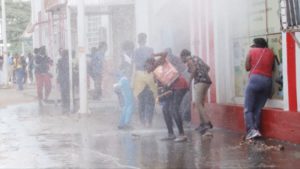 “Two years have elapsed while the Burundian people are living in tears and sadness following the violation of the Arusha Peace Accord by President Nkurunziza and his CNDD-FDD party,” said Pierre Claver Mbonimpa, two years after the start of protests against Pierre Nkurunziza’s third term on 26 April 2015.
“Two years have elapsed while the Burundian people are living in tears and sadness following the violation of the Arusha Peace Accord by President Nkurunziza and his CNDD-FDD party,” said Pierre Claver Mbonimpa, two years after the start of protests against Pierre Nkurunziza’s third term on 26 April 2015.
This human rights activist advances a figure of more than 2,000 people dead during this period. He says more than 8,000 people have been imprisoned and thousands of Burundians have gone into exile due to insecurity.
Mr. Mbonimpa says hundreds of Burundians have gone missing, the rape of women in front of their children and the torture of hundreds of people. “As we have always said, we are not slaves of Nkurunziza who seized power by force.”
The National Independent Commission for Human Rights (CNIDH) gives a death toll reaching 720. CNIDH recognizes 80 proven cases of torture and 800 cases of people incarcerated in violation of legal procedures.
The failed Coup
Demonstrations against Pierre Nkurunziza’s third term began on 26 April 2015 in several neighborhoods of the capital. The young and old from Nyakabiga, Musaga, Ngagara, Cibitoke, Mutakura took to the streets. Népomuscène Komezamahoro, a 15 year-old killed in Cibitoke neighborhood, is the first victim of this crisis. After several days of demonstrations, the protesters were gunned down by the police, which also suffered some damage. The aim of the demonstrators was to arrive in the city center.
On Wednesday, 13 May 2015, on the fifteenth day of the demonstrations, President Pierre Nkurunziza flew to Dar-es-Salaam to attend the summit of Heads of State of the East African Community over the political and security situation in Burundi. Since the morning, protesters from all over the capital had been trying to invade the city center but in vain. To a great surprise and for the first time, women arrived at the Independence Square, right in the center of the city. This reinvigorated other demonstrators. “The victory is near”, they said. Other protestors succeeded in joining women in the city center.
In the afternoon of May 13, the information fell. Major General Godefroid Niyombare had just overthrown Nkurunziza. In the protesting neighborhoods and the city center, it was jubilation.
Demonstrators shouted victory. Protesters stood on armours.
This joy lasted only for short, because around 5:30 pm, the imminent return of Pierre Nkurunziza was announced. Protesters began to despair. The coup had failed.
On Friday 15 May, three leaders, including Major General Cyril Ndayirukiye, number two of the failed coup, and about fifteen men were arrested in Kibenga-Lac area.
Some protesters went to ground; others took the road to exile. According to the latest UNHCR figures, there are more than 400,000 refugees. Mass arrests were made. It was the beginning of a long series of horrors.
The attack and repression of 11-12 December 2015
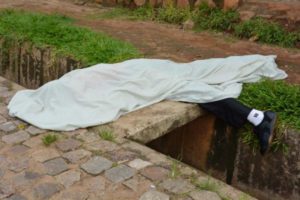 The security situation was gradually deteriorating. Grenades were thrown into public places. Dead bodies were found here and there. And then, December 11, 2015 arrived. The inhabitants of the city of Bujumbura will always remember this day. Four military camps, the Ngagara Camp, the Higher Institute of Military Officers (ISCAM), the National Defense Forces Logistics Base Camp (BLFDN) and the Mujejuru camp were attacked during the night.
The security situation was gradually deteriorating. Grenades were thrown into public places. Dead bodies were found here and there. And then, December 11, 2015 arrived. The inhabitants of the city of Bujumbura will always remember this day. Four military camps, the Ngagara Camp, the Higher Institute of Military Officers (ISCAM), the National Defense Forces Logistics Base Camp (BLFDN) and the Mujejuru camp were attacked during the night.
The next day, the city woke up in shock. Bodies were found in the streets of Ngagara, Nyakabiga and Musaga neighborhoods. The army spokesman, Colonel Gaspard Baratuza, said 12 assailants were killed and 21 captured during the attacks. He said the attackers intended to attack the military camps to get weapons and ammunition.
Residents accused security forces of deliberately executing young people several hours after the attack. There were also reports of robbery and rape during searches, what the police denied. Local and international civil society organizations talked about hundreds of civilians killed by the security forces and buried in mass graves.
A crisis with great misfortune
In addition to these ordinary citizens, prominent political figures, opposition leaders, civil society figures and army officers have been killed or have barely escaped attacks since the beginning of the crisis.
Several officers of the national army were assassinated, including Brigadier General Athanase Kararuza, a soldier from the former Burundian army (FAB) who was assassinated with his wife, daughter and one of his bodyguards at Gihosha area. It was on 25 April 2016. Colonel Emmanuel Buzubona, former rebel of the CNDD-FDD movement, and Captain Elie Mugabonuwundi, from the former army, were killed on 7 April and 20 April 2016 respectively.
After the assassination of Lieutenant-Colonel Darius Ikurakure, ex-combatant of the CNDD-FDD, Commander of the Civil Engineering Battalion at Camp Muzinda, on 22 March 2016 in the compound of the General Staff of the Burundian army, Major Didier Muhimpundu, (from FAB), Deputy Director of the Health Service at the Burundi army headquarters, was also killed. On 18 January 2016, OPPI Anicet Dusabumuremyi was assassinated at the 6th Avenue in Bwiza.
Jean Bikomagu, a retired colonel and former army chief of staff from 1993 to 1996, was murdered on 15 August 2015 in front of his home in Kabondo area. On 2 August 2015, the world learned of the death of Lieutenant-General Adolphe Nshimirimana, ex-rebel, former Head of the SNR (National Intelligence Service) at Gare du Nord, Kamenge zone in a rocket attack.
Among the civilians, there is the assassination on 13 October 2015 of cameraman of the National Television, Christophe Nkezabahizi and his family, as well as the assassination of Hafsa Mossi, the East African Community Legislative Assembly MP, on Wednesday 12 July 2016 at 10.30 a.m. in Gihosha on Nyankoni Avenue.
Others were lucky enough to survive attacks
As he was returning home at Carama in Kinama zone, Pierre-Claver Mbonimpa, a human rights defender, was seriously wounded on August 3, 2015 by a bullet in his face, fired by unknown motorcyclists.
On September 11, 2015, it was the turn of the Chief of Staff of the Burundian army, Prime Niyongabo, who survived an ambush on the Rumonge road near Muha bridge. He came out unscathed.
The toll was 6 people killed including 3 bodyguards, one civilian working at the Ministry of Public Security and two assailants.
On Monday, November 28, 2016, President Nkurunziza’s senior communication advisor, Willy Nyamitwe, also survived an attack at around 9:10 pm, about fifty meters from Caravan Beach Bar in Kajaga area. He was wounded on the arm and one of his guards killed.
Lull or change of strategy?
According to the Vice-President of the Republic, Gaston Sindimwo, peace and security prevail throughout the national territory. For him, there is no crisis in Burundi. The same goes for Pierre Nkurikiye, the police spokesman. “The security situation is good. What we see today is common criminality ”
As far as the civil society is concerned, the security situation is analyzed differently. “The international meetings taking place in Burundi show that peace reigns in Burundi,” says Hamza Burikukiye, Legal Representative of Capes +. This is also the opinion of Gilbert Bécaud Njangwa, Legal Representative of ONELOP-Burundi. “The crimes we see today are related to the settling of accounts, witchcraft or banditry. These are the consequences of war. ”
For Armel Niyongere, a human rights activist, Gaston Sindimwo’s remarks are hurtful to the families of the victims who continue to lose theirs each day. “It is quite ridiculous to hear that from such a personality when many families continue to cry for their missing, tortured and even executed people.” For him, all this confirms that some authorities are afraid of being prosecuted for their participation in these crimes as perpetrators, accomplices or sponsors.
Human rights
Divergences
During these two years of crisis, actors in the Burundian crisis have produced reports and counter-reports on the violations of human rights.
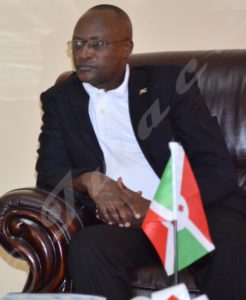 “Since the start of the 26 April 2015 demonstrations against President Pierre Nkurunziza’s third term, the Burundian government has continued to repress all forms of actual or alleged political opposition,” said human rights activist Anschaire Nikoyagize. According to him, other forms of inhuman and degrading treatment, arbitrary arrest and imprisonment were recorded.
“Since the start of the 26 April 2015 demonstrations against President Pierre Nkurunziza’s third term, the Burundian government has continued to repress all forms of actual or alleged political opposition,” said human rights activist Anschaire Nikoyagize. According to him, other forms of inhuman and degrading treatment, arbitrary arrest and imprisonment were recorded.
As for the president of CNIDH, the National Independent Commission on Human Rights, he finds that the human rights situation has improved considerably from the second half of 2016.
Since the beginning of the crisis, the United Nations, local and international civil society organizations have produced reports of human rights violations, most of them overwhelming for Bujumbura. At the same time, the Burundian government issued counter-reports denying all allegations and took serious measures against some organizations.
Accusations and replies
The findings of the UN Independent Investigation on Burundi (EINUB), published on Tuesday, 20 September 2016, declare the government of Burundi an outlaw. The report accuses Bujumbura of serious violations of human rights. The investigation refers to 17 forms of torture and ill-treatment, including attaching weights to the victim’s testicles, grinding fingers and toes with forceps, progressive torch burns, or being forced to sit on acid, broken glass or nails.
Burundi Government says it is a plot hatched by its opponents. Willy Nyamitwe, Senior communications advisor to President Nkurunziza, said investigators’ charges were politically motivated and based on anonymous and unverified testimonies. He continued to say that that they were cabaret gossips.
This did not prevent the UN Human Rights Council from adopting a resolution on September 30, 2016 in Geneva, Switzerland, setting up an independent commission of inquiry to determine, within a one year limit, the perpetrators of human rights violations in Burundi and propose sanctions against them.
In response, Bujumbura suspended cooperation and collaboration with the Office of the United Nations High Commissioner for Human Rights on 11 October 2016 following the publication of this report. At the same time, the three UN experts who produced the report were declared persona non grata on the national territory.
On 18 October 2016, Burundi withdrew from the International Criminal Court (ICC) following the opening of a preliminary examination. For human rights defenders, perpetrators of human rights violations want to escape prosecution. The following day, five civil society organizations (FORSC, FOCODE, APRODH, ACAT and RCP) were struck off on 24 October; five others (COSOME, CB-CPI, UBJ, Iteka League and SOS torture Burundi) were suspended. The Iteka League was struck off after the publication of the report it co-produced with FIDH entitled “BURUNDI: Répression aux dynamiques génocidaires”(Repression of genocidal dynamics).
“Nothing but biased reports!”
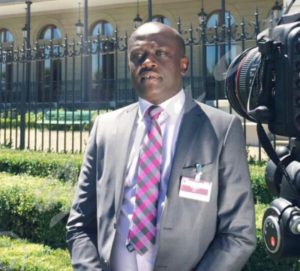 The UN High Commissioner for Human Rights, Zeid Ra’ad Al Hussein, has repeatedly issued statements denouncing serious violations by the Imbonerakure, youth wing of the ruling party CNDD-FDD, and the security forces. The latest is the one denouncing the chilling video of the young Imbonerakure of Ntega commune in Kirundo province calling for the impregnation of the females from the opposition so that they give birth to Imbonerakure.
The UN High Commissioner for Human Rights, Zeid Ra’ad Al Hussein, has repeatedly issued statements denouncing serious violations by the Imbonerakure, youth wing of the ruling party CNDD-FDD, and the security forces. The latest is the one denouncing the chilling video of the young Imbonerakure of Ntega commune in Kirundo province calling for the impregnation of the females from the opposition so that they give birth to Imbonerakure.
“The Ntega demonstration is not an isolated case. This is the tip of the iceberg, “said Zeid Ra’ad Al Hussein. The CNDD-FDD party condemned this video speaking of an “external influence to the party.”
According to Gaston Sindimwo, First Deputy President, the culture of human rights is not new for Burundians. “Human rights are respected in Burundi contrary to the opinions and biased messages conveyed by some people”, Sindimwo says.
Concerning the video of the Imbonerakure, he indicates that the chant was sung for cheering up rather than calling for the violation of human rights. He deplored the fact that some Burundi partners had suspended their co-operation “on the pretext of wishing to ensure respect for human rights”. “This measure does not advance the cause of human rights in our country; on the contrary it affects them negatively.”
Gilbert Bécaud Njangwa finds it normal that international organizations produce biased reports because, according to him, they need work and so they target countries to destabilize. “We are analyzing whether Burundi is not taken as a scapegoat in a project by the great powers to destabilize the sub-region.” For him, human rights are respected.
This is not the opinion of Armel Niyongere. “There are targeted assassinations, enforced disappearances, sexual violence, etc. perpetrated in the country with impunity.”According to him, it is not enough to respect some rights while others are being violated because they are indivisible and stick together. “Today, there is neither freedom to inform and be informed nor the freedom of assembly, or even less the right to equality before the law.”
Media
The media sector hit hard
Assassination, disappearance and exile of journalists, destruction and closure of the media, restriction of freedoms of movement … this is the bleak picture of the Burundian media in the world, two years after the outbreak of the crisis.
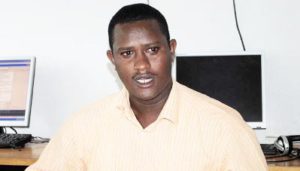
Alexandre Niyungeko: “… the journalist has the right to move freely when he has a press card”
In the wake of the failed coup of 13 May 2015, five media were destroyed and closed. Alexandre Niyungeko, Chairman of the Union of Burundian Journalists (UBJ) cites Bonesha FM, Isanganiro, RPA, REMA Fm and Renaissance radio and television. “So, a hundred journalists have taken the road to exile,” he said. He also returns to the cowardly murder of journalist Christophe Nkezabahizi, cameraman of the National Television and his family, the disappearance of Jean Bigirimana, journalist at Iwacu Press Group.
A climate which is not favorable to the development of the sector: “Private media journalists are condemned to hide when they are seeking information, mistreated, arrested without any legal basis, etc.” “He says.
This affects even the public media where some journalists are favored while others are prevented from covering one or another event. Niyungeko denounced a maneuvering to divide journalists by allowing some to cover public events while others are not welcome.
The chairman of UBJ also protests against the requirement of the order of mission to any journalist who goes on the ground. “The information is not always programmed and a journalist has the right to circulate freely with a press card”, he explains.
The chairman of UBJ recognizes some signs of hope, but which are only a window-dressing. Here, he evokes the reopening of two radio stations namely Isanganiro and Rema Fm. Nevertheless, he deplores the fact that this has been done under some conditions.
For him, signing an act of engagement is a disguised way of continuing to hold journalists hostage. A kind of intimidation because, he justifies, this act is not provided for by any law governing the press.
This was demonstrated by the summoning of Joseph Nsabiyabandi, chief editor of Isanganiro Radio, the refusal to relay particular information or make a source speak. He says: “The climate is not conducive to the development of the media.”
A crisis of confidence
For Samson Manirakunda, Director of Radio Isanganiro, there is a sharp decline in the media sector. Before the crisis linked to the 3rd term, he says, Burundi was ranked among the first countries where press freedom was developed. “With the crisis, there is lack of confidence between the power and the press,” he said. As a result, today officials are reluctant to provide information and demand mission orders.
Nevertheless, the director of Radio Isanganiro says it is up to the journalists to work while taking into account the context. According to him, the government is defensive and doubts the good will of the journalists.
For his part, Claude Nkurunziza, Director of Rema and Radio and Television, finds that this regression of freedom of the press is debatable.
He justifies his statement saying that some journalists are partially responsible for the current situation of the media.
Moreover, he doubts the veracity of the number of a hundred journalists who have fled the country. For him, many journalists are in the country and independent newspapers exist in Burundi.
Finance in precarious situation
“Almost all our equipment has been destroyed,” says Claude Nkurunziza, Director of Rema. He deplores the fact that the criminals have not yet paid for their acts. With the reopening, he says, the radio has used the equipment belonging to other radio stations. This, in turn, narrows the scope of coverage.
The same goes for Radio Isanganiro where the director talks about a high cost of repairing equipment, damaged vehicles, etc.
Worse still, Mr. Nkurunziza says most Burundian media live on aid from donors. And with the crisis, the problem of funds has become acute because of the lack of funding. He also denounced the fact that some donors have rather chosen to support the media working abroad especially in Rwanda.
This lack of funding has a negative impact on the work of these media. Samson Manirankunda speaks of the low territorial coverage, the technical unemployment of the staff, no new recruitment, etc.
Nevertheless, Mr. Nkurunziza remains hopeful that with the year 2018, media funding will be able to resume and that the media support fund promised by the government will be given.
“Press freedom in difficult situation”
The 2017 edition of the Reporters without Borders (RSF) in its World Press Freedom Index reports that Burundi has fallen four places in terms of press freedom. Thus, it occupies the 160th position and is the first of the twenty-one countries of the black zone.
RSF links the situation to the crisis stemming from the challenge of the third term of Pierre
Nkurunziza in 2015. Thus, analyzes this organization, press freedom is in a difficult situation.
“Pursued as” coup plotters “, dozens of journalists have fled the country, while for those who stayed in the country, informing becomes very difficult”, RSF ranking details.
This does not convince Hamza Venant Burikukiye, president of the group of associations of people infected with and affected by HIV / AIDS (CAPES +). “In Burundi, press freedom is guaranteed despite the incidents that occurred in 2015,” he responded. He calls on journalists to be impartial and avoid a subversive language.
Reacting to the cases of journalists in exile as well as the destroyed and closed media, Mr.
Burikukiye says it is deplorable. Nevertheless, there are some who are being prosecuted for their role in the 2015 events, he says.

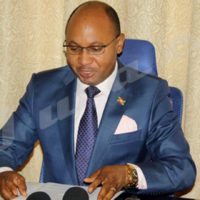
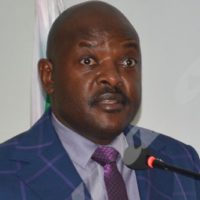
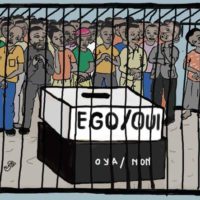
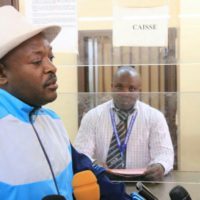
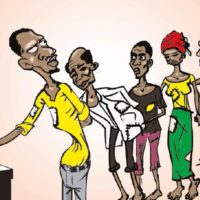













 IWACU Open Data
IWACU Open Data

